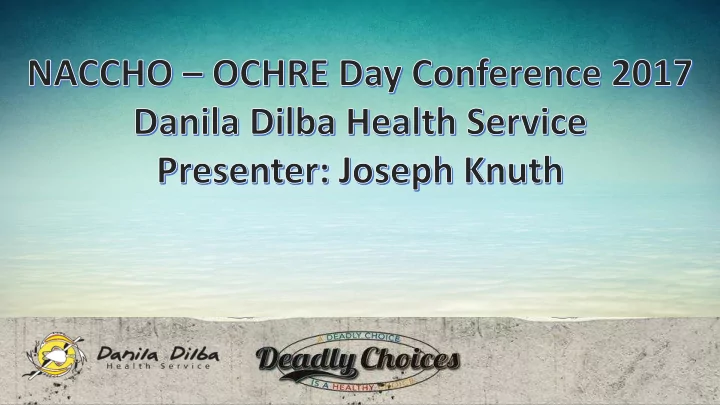

A campaign developed to encourage Aboriginal and Torres Strait Islander community to make healthy lifestyle choices that would increase life expectancy, while also preventing and managing chronic illness.
Deadly De ly Choi oices ac activit ities Healthy lifestyle Social Social marketing program media campaign Tobacco Cessation Cooking Community Sport & programs days Recreation programs
Healthy Lifestyle Education Program 9 x 90 minute sessions (flexible) 1. Leadership 2. Chronic disease 3. Healthy Minds 4. Tobacco 5. Nutrition 6. Physical activity 7. Harmful substances 8. Healthy relationships 9. Medicare & health Checks
What’s the need for a Deadly Choices program? Why is it important?
Aboriginal and Torres Strait Islander people have significant gaps in their health and wellbeing compared to non-indigenous people. Health and wellbeing is linked to other factors such as employment, education, housing and social circumstance
Close the Gap? • Most Australians enjoy one of the highest life expectancies of any country in the world. This is not true for Aboriginal and Torres Strait Islander people. • Aboriginal and Torres Strait Islander people can expect to live 10-17 years less than other Australians. • Babies born to Aboriginal mothers die at more than twice the rate of other Australian babies, and • Aboriginal and Torres Strait Islander people experience higher rates of preventable illness such as heart disease, kidney disease and diabetes.
This makes a gap between Aboriginal and Torres Strait Islander and Non- Indigenous life expectancy of: 10.6 YEARS FOR MALES Males (Source: ABS 2012) 100 79.8 Life expectancy (years) 80 70.5 68.7 67.4 65 63.4 60 40 20 0 Non- NSW QLD WA NT All Indigenous Indigneous Australians Australians Aboriginal and Torres Strait Islander peoples
Close the Gap The death rates for Indigenous Australians are on par with some of the world’s most impoverished nations. Statistics indicate that Australia and Nepal have the world’s worst life expectancy gaps between Indigenous and non-Indigenous people. With your help we aim to close this health gap and achieve Aboriginal and Torres Strait Islander health equality within a generation.
In 2012 – 13, two in five (41%) Aboriginal and Torres Strait Islander people aged 15 years and over smoked on a daily basis. That’s twice as many as This can lead non-indigenous people! to higher rates of chronic diseases such as lung cancer, emphysema and asthma.
Key Health Findings • Around 1 in 8 Aboriginal and Torres Strait Islander people had heart disease. • Around 1 in 12 Aboriginal and Torres Strait Islander people had diabetes mellitus and/or high sugar levels in their blood or urine. • 2 in 3 Aboriginal and Torres Strait Islander people aged 15 years and over were overweight or obese according to their BMI (Body Mass Index). • 1 in 6 Aboriginal and Torres Strait Islander people have asthma.
Preventable Risk Factors of Chronic Disease • Tobacco smoking • Alcohol consumption • Harmful substance use • Poor dietary behaviours • Low physical activity levels • Overweight/obesity status
Health Checks The main goal of Deadly Choices is to encourage Aboriginal and Torres Strait Islander people to access their local health service and complete an annual “Health Check”. ➢ Not just to see the doctor when they are sick, but ➢ To visit their health service and access support to prevent or better manage their chronic disease and remain healthy.
Health Checks 2013-14 2014-15 2015-16 2016-17 Completed Child health check 0-4 years 48% 42% 41% 56% Completed Adult Health Checks 15-54 years 31% 34% 38% 45% Completed Mens Health Checks 715 1248 1250 1378 1765
Deadly Choices Tips Sa Safe fe Drink Drinking ing Physi Ph ysical Act cal Activ ivity ity Giving up the Smokes - 2 cans a day is OK, - Sit less - If you smoke start also allow for a day or - An adult only quitting, it is never to two without. needs to exercise late to quit - Alcohol can hurt 30 minutes a day to - Your smoking hurts your family stay healthy your kids and others Healthy Diet Emot Emotio ional nal and and Soci Social Well al Well-being being - We can help if you are feeling sad or - Half your plate worried vegetables - Water is best
Recommend
More recommend